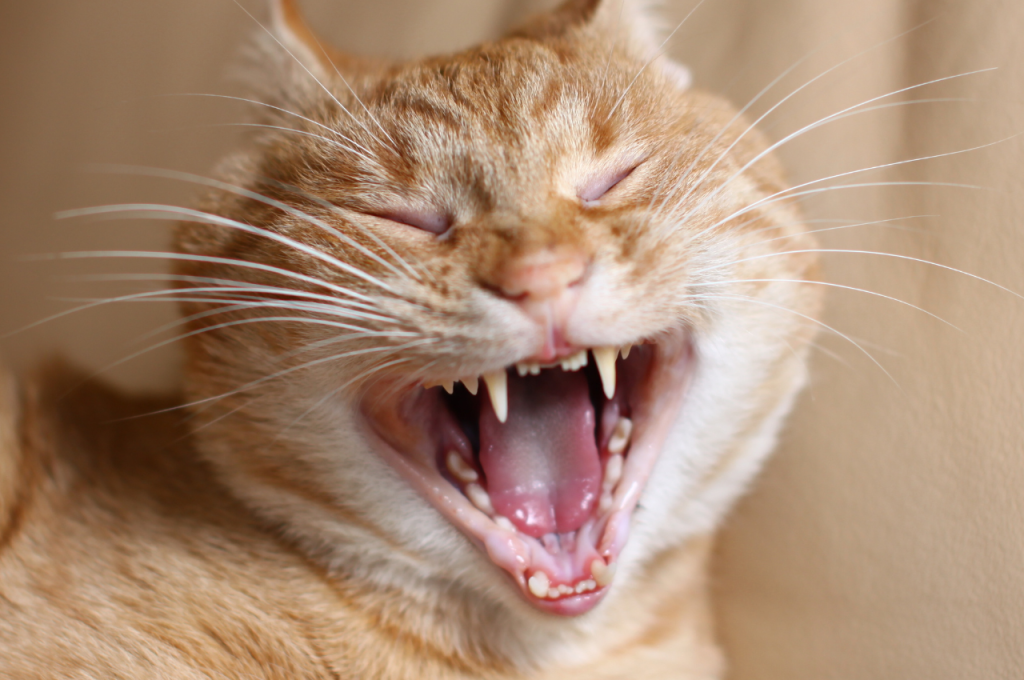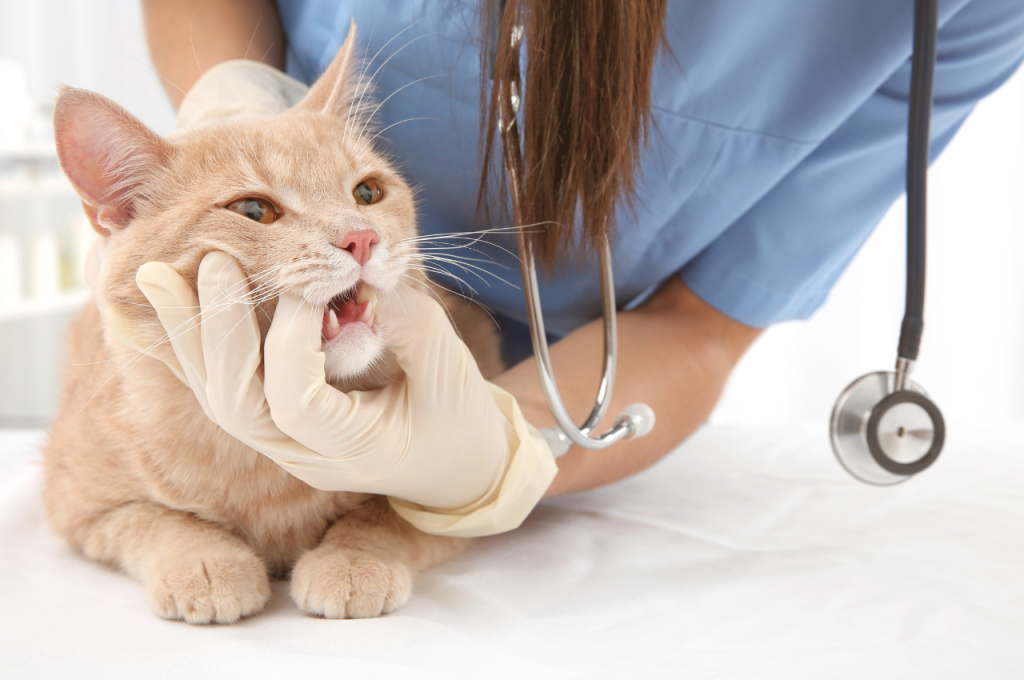To improve your cat’s breath, try brushing their teeth and providing dental treats. Maintaining good oral hygiene is essential for your furry friend’s overall health.
Bad breath in cats can indicate dental problems, such as gum disease or tooth decay. Brushing your cat’s teeth regularly and providing dental treats can help prevent these issues and freshen their breath. Additionally, feeding your cat high-quality food and providing plenty of fresh water can also improve their oral health. If your cat’s bad breath persists despite these measures, it’s important to consult with a veterinarian to rule out any underlying medical conditions.
The Stinky Truth Behind Bad Cat Breath
Are you wrinkling your nose every time your feline friend meows in your face? Bad breath isn’t just a problem for humans it can also plague our beloved cats. Known as halitosis, bad breath in cats can be caused by a variety of factors, some of which may indicate underlying health issues. Let’s take a closer look at the common causes of halitosis in cats and the health risks associated with poor oral hygiene.

Common Causes Of Halitosis In Cats
Several factors can contribute to your cat’s less-than-pleasant breath. Common causes of halitosis in cats include:
- Poor dental hygiene
- Plaque and tartar buildup
- Gum disease
- Oral infections
- Foreign objects stuck in the mouth
Health Risks Associated With Poor Oral Hygiene
While bad breath may seem like a minor inconvenience, it can actually indicate more serious health issues. Poor oral hygiene in cats can lead to:
- Gingivitis
- Periodontal disease
- Oral pain and discomfort
- Systemic infections
Regular Dental Check-ups
Maintaining regular dental check-ups for your feline friend is crucial for improving their breath. Professional cleanings can address underlying issues causing bad breath in cats, ensuring their oral health is in top condition. A healthy mouth equals fresher breath for your beloved pet.
Regular dental check-ups are essential for maintaining your cat’s oral health and freshening their breath. Just like humans, cats can develop dental issues such as tartar buildup, gum disease, and tooth decay. By scheduling regular visits to the veterinarian for dental exams, you can ensure that any potential problems are detected early on and treated promptly. In this section, we will explore the importance of veterinarian visits for your cat’s dental health and what to expect during a dental exam.
Importance Of Veterinarian Visits
Regular visits to the veterinarian play a crucial role in keeping your cat’s teeth and gums healthy. During these visits, the veterinarian will not only examine your cat’s teeth and mouth but also check for any signs of oral diseases or abnormalities. These visits allow for early detection of dental problems, which can help prevent further complications and discomfort for your furry friend. Additionally, the veterinarian can provide professional dental cleaning, removing any plaque or tartar buildup that regular brushing may not fully address. By addressing these dental issues early on, you can help improve your cat’s breath and overall oral health.
What To Expect During A Dental Exam
During a dental exam, the veterinarian will thoroughly assess your cat’s oral health. The exam typically includes the following steps:
- The veterinarian will start by examining the exterior of your cat’s mouth, checking for any visible signs of oral diseases or abnormalities.
- Next, the veterinarian will carefully inspect your cat’s teeth, gums, and tongue, looking for any signs of inflammation, redness, swelling, or lesions.
- If necessary, the veterinarian may recommend dental X-rays to assess the health of the teeth below the gum line, as well as the jaw and surrounding structures.
- Based on the examination findings, the veterinarian may recommend further treatment options such as dental cleaning, extractions, or other dental procedures.
Regular dental check-ups are an integral part of maintaining your cat’s oral health and preventing bad breath. By visiting the veterinarian regularly, you can ensure that any dental issues are addressed promptly and that your cat’s teeth and gums remain healthy. Remember, prevention is key when it comes to oral health, so schedule those check-ups and keep your furry friend’s breath fresh and their smile bright!
At-home Oral Care Routine
As a responsible cat owner, maintaining your feline friend’s oral hygiene is crucial for their overall health and well-being. Implementing an effective at-home oral care routine can help improve your cat’s breath and prevent dental issues. Here’s a guide to creating an at-home oral care routine and alternative dental care products to ensure your cat’s oral health is in top condition.
Step-by-step Guide To Brushing Your Cat’s Teeth
Brushing your cat’s teeth is a key part of their oral care routine. Follow these steps for a successful brushing session:
- Prepare by gathering a feline toothbrush, veterinary toothpaste, and treats for positive reinforcement.
- Introduce your cat to the toothbrush and toothpaste by letting them sniff and taste it.
- Gently hold your cat and start by massaging their gums with your fingers to get them accustomed to the sensation.
- Once your cat is comfortable, apply a pea-sized amount of toothpaste to the brush and carefully brush their teeth using circular motions.
- Reward your cat with treats and praise to create a positive association with the experience.
Alternative Dental Care Products
If your cat is not receptive to traditional tooth brushing, alternative dental care products can be effective in maintaining their oral health:
- Dental wipes: These wipes are designed to remove plaque and freshen your cat’s breath with regular use.
- Water additives: Adding dental water additives to your cat’s drinking water can help reduce plaque and tartar buildup.
- Dental treats and toys: Special dental treats and toys are formulated to promote oral health by reducing plaque and tartar while satisfying your cat’s natural chewing instincts.
- Oral gels and sprays: These products are designed to support oral hygiene by reducing bacteria and freshening breath.
Choosing The Right Diet For Dental Health
Choosing the right diet for dental health is crucial in improving your cat’s breath. A good diet can promote healthy teeth and gums, reducing the risk of dental issues that can lead to bad breath. Let’s explore the different aspects of feline nutrition that can contribute to better oral health.

Dry Vs. Wet Food: Pros And Cons
When selecting the best diet for your cat’s dental health, it’s important to consider the pros and cons of both dry and wet food options. Here’s a comparison:
| Criteria | Dry Food | Wet Food |
| Dental Health Benefits | Helps reduce plaque and tartar buildup | Less effective in cleaning teeth |
| Hydration | May not provide sufficient moisture | Contributes to overall hydration |
| Palatability | Some cats prefer the crunchiness | More appealing to picky eaters |
Supplements And Treats For Healthy Teeth
Aside from the primary diet, supplements and treats can play a role in maintaining your cat’s dental health. Consider the following options:
- Dental Treats: specially formulated to promote dental hygiene
- Dental Gels: for application on the teeth and gums
- Dental Supplements: containing ingredients like seaweed or enzymes
- Chew Toys: can help reduce plaque and keep teeth clean
Professional Dental Cleaning
To improve your cat’s breath, consider professional dental cleaning. This procedure can remove plaque and tartar buildup, addressing the root cause of bad breath. With regular cleanings, your cat’s oral health can improve, leading to fresher breath and better overall well-being.
The Procedure And Aftercare
Professional dental cleaning for cats is crucial for maintaining good oral health. It is recommended when routine care isn’t enough to address persistent bad breath and tartar buildup.
When To Consider A Professional Clean
Consider professional dental cleaning if your cat’s breath remains foul despite regular brushing and if you notice yellow-brown deposits on their teeth.
The Procedure And Aftercare
During a professional dental cleaning, a veterinarian will examine your cat’s teeth, perform a thorough cleaning, and address any underlying issues. Aftercare involves monitoring for any signs of discomfort or changes in eating habits. In summary, professional dental cleaning is essential for maintaining your cat’s oral health.
Toys That Promote Dental Health
Enhance your cat’s oral health with toys designed to improve dental hygiene and freshen your breath. Look for toys that encourage chewing and help reduce plaque and tartar buildup. Keep your feline friend’s breath fresh and promote dental health with the right toys.
Cats are known for their fastidious grooming habits, but even with regular brushing and cleaning, their breath can still be less than pleasant. Bad breath in cats can be caused by a variety of factors, including dental issues, digestive problems, and even certain medications. If you’re looking for a way to improve your cat’s breath, one solution is to provide them with toys that promote dental health.
Interactive Toys For Chewing
Interactive toys that encourage your cat to chew can help keep their teeth clean and healthy. Look for toys that are designed to be chewed on, such as rubber toys that are shaped like bones or dental chews that help remove plaque and tartar buildup. You can also try toys that dispense treats as your cat chews, which can help keep them engaged and interested in the toy.
Safe Materials For Dental Toys
When choosing dental toys for your cat, it’s important to select toys made from safe materials. Avoid toys that are made from materials that can easily break apart and be swallowed, such as plastic or foam. Instead, look for toys that are made from durable materials, such as rubber or nylon, that can withstand your cat’s chewing.
Additionally, make sure any toys you choose are non-toxic and free from harmful chemicals that could be harmful to your cat’s health. Toys that promote dental health can be a great addition to your cat’s routine, helping to keep their teeth clean and their breath fresh. By choosing interactive toys for chewing and safe materials for dental toys, you can help ensure your cat’s dental health for years to come.
Recognizing When It’s More Than Just Bad Breath
Improve your cat’s breath by recognizing when it’s more than just bad breath. Discover the underlying causes and effective solutions to tackle the issue, ensuring your furry friend’s oral health is in top shape.
Signs Of Dental Disease
Look out for swollen gums, yellow or brown teeth, and difficulty eating.
Other Health Issues Revealed By Oral Odors
- Foul breath can indicate kidney disease or diabetes in cats.
- If your cat’s breath is consistently foul, it could indicate underlying health issues.
Staying Proactive With Your Cat’s Dental Health
As a cat owner, it’s your responsibility to ensure that your feline friend’s dental health is in good condition. Your cat’s bad breath could be an indication of poor dental hygiene, which can lead to a host of health problems down the line. To help prevent this, it’s important to stay proactive with your cat’s dental health by maintaining a routine and scheduling regular assessments and adjustments.

Maintaining A Routine
One of the most important things you can do for your cat’s dental health is to establish a regular routine. This should include daily brushing of your cat’s teeth using a toothbrush and toothpaste specifically designed for cats. You can also give your cat dental treats and toys to help keep their teeth clean. It’s important to stick to this routine to ensure your cat’s dental health stays in top shape.
Regular Assessments And Adjustments
In addition to maintaining a routine, it’s important to schedule regular assessments and adjustments with your veterinarian. Your vet can perform a thorough dental exam to check for any signs of dental disease or other issues that may be affecting your cat’s dental health. They can also provide recommendations for any adjustments to your cat’s dental hygiene routine to ensure they stay healthy.
Staying proactive with your cat’s dental health is essential to keeping them healthy and happy. By maintaining a routine and scheduling regular assessments and adjustments with your veterinarian, you can help prevent dental disease and other health problems in your cat.
Conclusion
To sum up, freshening your cat’s breath is achievable with proper dental care. Regular brushing, dental treats, and vet check-ups are key. Remember, bad breath could signal an underlying issue. Prioritize your feline friend’s oral health for overall well-being and happy purrs.
